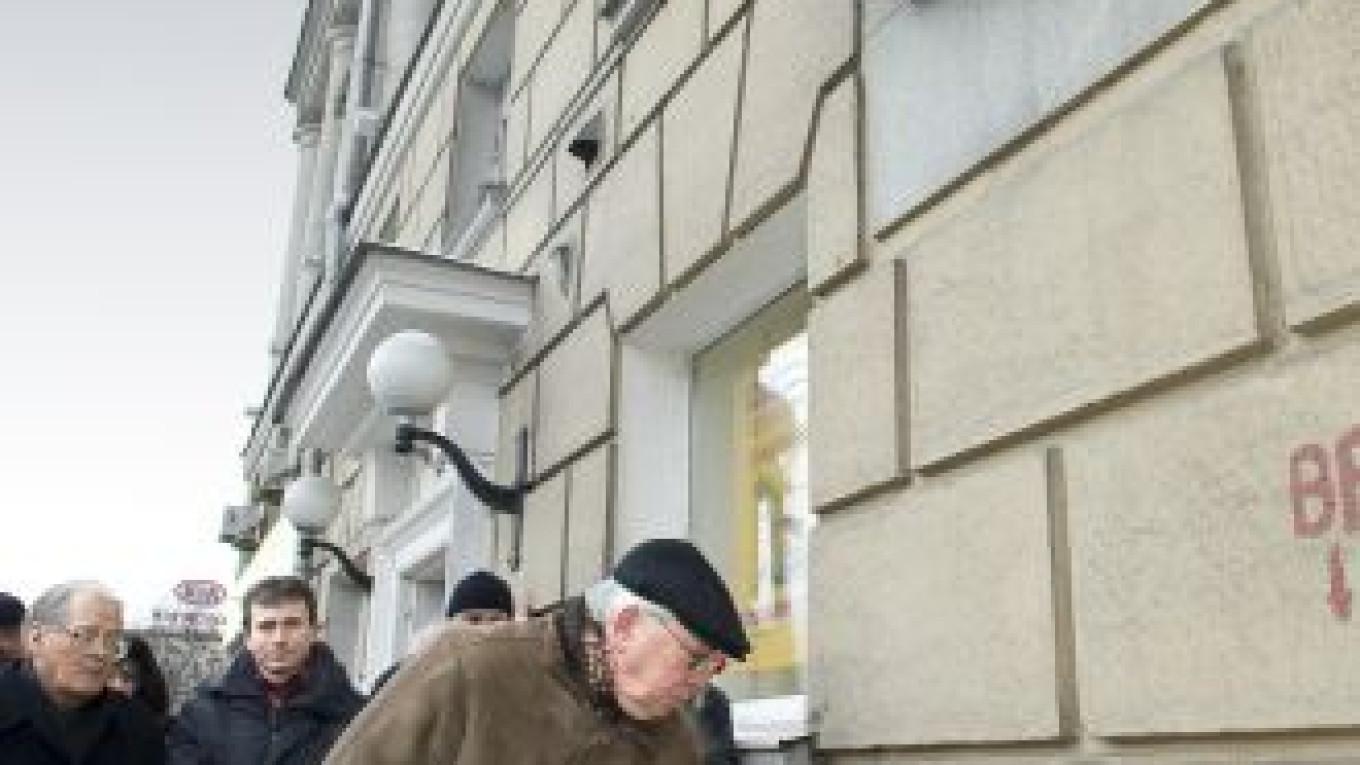President Dmitry Medvedev distanced himself from his mentor Vladimir Putin on Monday by praising the ideas of the late human rights champion Andrei Sakharov, even as rights activists complained that Medvedev has failed to make Sakharov’s vision a reality.
“Analyzing the experience of modern history, we can fully understand the deepness and actuality of Sakharov’s ideas,” Medvedev said in a letter to human rights groups gathered for a conference dedicated to Sakharov, the Nobel-winning nuclear scientist-turned-human rights campaigner.
Medvedev’s comments, made on what would have been Sakharov’s 90th birthday, marked a departure from his predecessor, Prime Minister Putin, who has never celebrated Sakharov’s legacy as the symbol of the human rights movement in Russia. Curiously, opposition activists from the banned National Bolshevik Party commemorated the 85th anniversary of Sakharov’s birth in 2004 with a rally demanding Putin’s resignation.
Medvedev, in sharp contrast to Putin, has made several steps toward the human rights community, giving an interview to the liberal Novaya Gazeta, freeing jailed Yukos lawyer Svetlana Bakhmina and, more recently, firing 20 prison officials after ordering an investigation into the November death of lawyer Sergei Magnitsky in a Moscow detention center.
But at the same time, human rights groups have continued to face pressure from the authorities, as in the recent case of Kazan-based Agora, which was hit with a large back tax claim that it says is punishment for its assistance to other nongovernmental organizations.
Veteran human rights activist Lyudmila Alexeyeva praised Medvedev on Monday as an “intelligent man” who is listening to human rights groups, but she said she was disappointed that he has not addressed specific issues brought to his attention at meetings of his presidential human rights commission in April and November.
Alexeyeva said she had asked Medvedev at the first meeting to review several laws and decrees that violated citizens’ constitutional right to protest peacefully and had expected to hear his comments at the second meeting, but that had not happened.
“I thought that he would tell us what has been done, but the problems still exist,” Alexeyeva, who heads the Helsinki Moscow Group, said at the opening of a two-day conference titled “Sakharov’s Ideas Today.”
Alexeyeva cited the recent example of an opposition group that tried to organize a peaceful rally outside the presidential administration building on Constitution Day last Saturday. Activists Mikhail Kriger and Sergei Konstantinov, who carried a sign reading, “Respect the Russian Construction,” were detained by plainclothes officers with the Federal Guard Service. Alexeyeva said the officers did not show their IDs to demonstrators and beat several of them.
Alexeyeva’s colleague Sergei Kovalyov, once Sakharov’s aide and Russia’s first ombudsman in the early 1990s, went even further, criticizing Medvedev’s support of Chechen President Ramzan Kadyrov, whom he called a “bandit.”
“Authorities of a country where political murders take place are always guilty,” Kovalyov said, referring to the unsolved murder of Chechen human rights activist Natalya Estemirova in July.
Kadyrov, a former guerilla leader who sided with the Kremlin during the second war in Chechnya, was promoted by the Interior Ministry to the rank of police lieutenant-general on Monday.
Human rights abuses in Russia are of “deep concern,” Thomas Hammarberg, the Council of Europe’s human rights commissioner, said at the conference. He said more than 3,000 people were still missing in Chechnya.
But Hammarberg also said he saw some progress, with NGOs becoming more active in society and a network of ombudsmen expanding across the country.
Heidi Hautala, chairwoman of the European Parliament’s Subcommittee on Human Rights, noted that federal ombudsmen Vladimir Lukin, who also attended Monday’s conference, had helped her enter a prison in Yekaterinburg to meet with opposition activist Alexei Nikiforov, who is serving a prison sentence on extremism charges. Nikitin was jailed for raising a banner reading “Enough of Putin!” opposite United Russia’s headquarters in Yekaterinburg last spring. “I am deeply concerned when people who peacefully demonstrate are detained and beaten. According to the Russian law, I am an extremist,” Hautala said.
Speaking to The Moscow Times, Alexeyeva said she understood that activists’ latest criticism of the authorities might deprive them of whatever support Medvedev has offered them. But she said the issue was bigger than any one person. “I don’t connect the situation of an improvement of human rights with Medvedev or any particular president. If a civil society is to emerge in Russia, any president will have to take it into account,” she said.
A Message from The Moscow Times:
Dear readers,
We are facing unprecedented challenges. Russia's Prosecutor General's Office has designated The Moscow Times as an "undesirable" organization, criminalizing our work and putting our staff at risk of prosecution. This follows our earlier unjust labeling as a "foreign agent."
These actions are direct attempts to silence independent journalism in Russia. The authorities claim our work "discredits the decisions of the Russian leadership." We see things differently: we strive to provide accurate, unbiased reporting on Russia.
We, the journalists of The Moscow Times, refuse to be silenced. But to continue our work, we need your help.
Your support, no matter how small, makes a world of difference. If you can, please support us monthly starting from just $2. It's quick to set up, and every contribution makes a significant impact.
By supporting The Moscow Times, you're defending open, independent journalism in the face of repression. Thank you for standing with us.
Remind me later.


